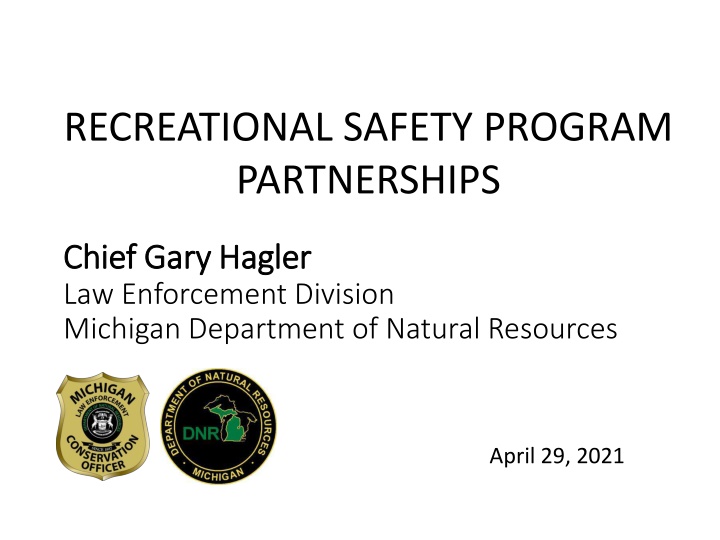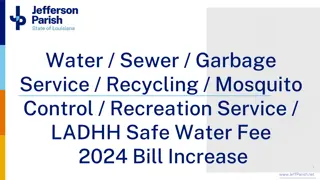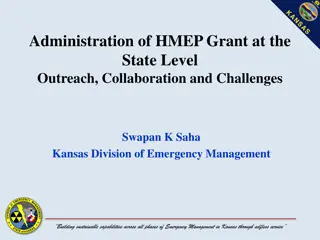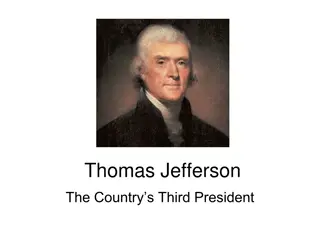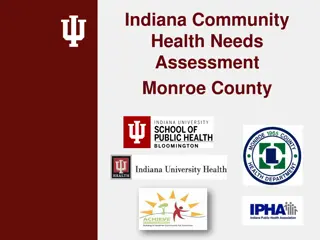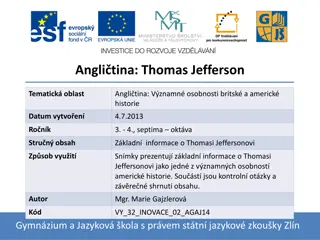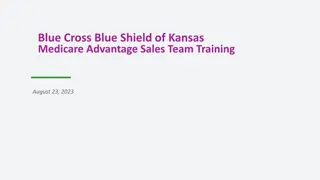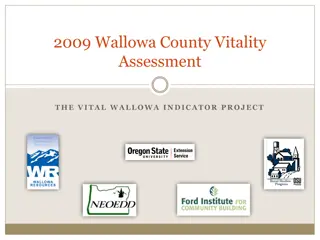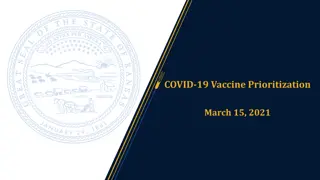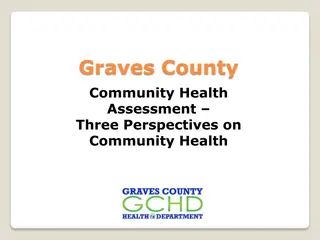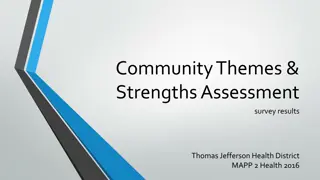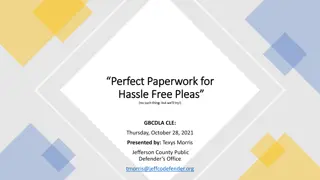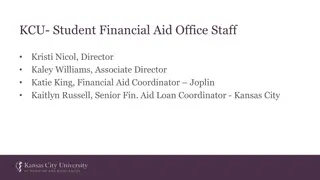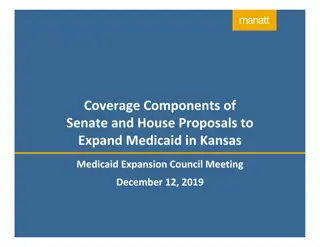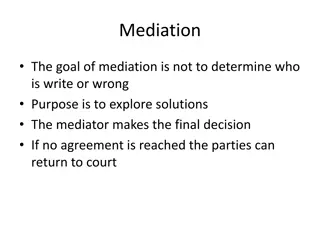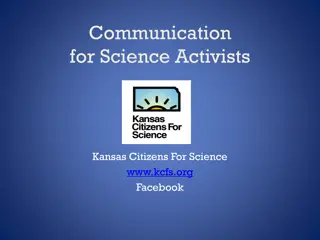Community Health Needs Assessment 2013 in Jefferson County, Kansas
This public document approved by the F.W. Huston Medical Center Board of Directors fulfills requirements under the Patient Protection and Affordable Care Act. Collaboration with community partners led to a thorough assessment focusing on holistic wellness in Jefferson County, KS. Using primary and secondary data collection methods, the assessment aimed to assess and improve the quality of life in the county through education, action, and leadership.
Download Presentation

Please find below an Image/Link to download the presentation.
The content on the website is provided AS IS for your information and personal use only. It may not be sold, licensed, or shared on other websites without obtaining consent from the author.If you encounter any issues during the download, it is possible that the publisher has removed the file from their server.
You are allowed to download the files provided on this website for personal or commercial use, subject to the condition that they are used lawfully. All files are the property of their respective owners.
The content on the website is provided AS IS for your information and personal use only. It may not be sold, licensed, or shared on other websites without obtaining consent from the author.
E N D
Presentation Transcript
RECREATIONAL SAFETY PROGRAM PARTNERSHIPS Chief Gary Hagler Chief Gary Hagler Law Enforcement Division Michigan Department of Natural Resources April 29, 2021
Law Enforcement Division | Michigan Department of Natural Resources Introduction Introduction The Law Enforcement Division (LED) has a wide array of responsibilities, including law enforcement, education, recreational safety training, public outreach, communications, and emergency response. LED works jointly with every branch of law enforcement: state, federal, local, and tribal. This presentation will outline the partnerships between Michigan Sheriff Offices and the Michigan DNR
Law Enforcement Division | Michigan Department of Natural Resources Partnerships and Joint Efforts Partnerships and Joint Efforts General Law Enforcement Marine Safety and Education ORV Enforcement and Education Snowmobile Enforcement and Education
Law Enforcement Division | Michigan Department of Natural Resources General Law Enforcement General Law Enforcement Rural Policing Back-up/support Search warrants Domestics assaults Mass casualties Be on the Lookout (BOLs) Barricaded person Natural disasters Traffic crashes Emergency management and homeland security
Law Enforcement Division | Michigan Department of Natural Resources Marine Safety and Education Marine Safety and Education Recreational Boating Safety Program Grants Liveries Local Watercraft Controls Boating Accident Reporting Marine Safety Education and Instructor Training
Law Enforcement Division | Michigan Department of Natural Resources Marine Safety Grants Marine Safety Grants Recreational Boating Safety (RBS) Grants are administered by the Grants Management Section of the Finance and Operations Division of the DNR, not the Law Enforcement Division. PROGRAM OBJECTIVE To promote safety in the use of recreational watercraft through enforcement and education. CRITERIA Grant funding is made available to county sheriff departments and is dependent on such factors as: The area of public waters to be patrolled The number of law enforcement personnel available for marine patrol The number of boat livery inspections to be conducted The extent of the county s boating safety education program ELIGIBILITY All counties are eligible to apply. Reimbursement funding can apply to recreational boating safety (RBS) activities: Marine patrol time Instruction of boating safety classes Inspection of boat liveries RBS operating costs Purchase and or maintenance of equipment necessary for the RBS program
Law Enforcement Division | Michigan Department of Natural Resources Marine Safety Grants Marine Safety Grants FUNDS AVAILABLE State Funds: Administered by the Michigan DNR Authority: PA 451 of 1994, as amended, Part 801 Marine Safety Amount is determined by legislature approval Reimbursement up to 75% of actual expenditures Federal Funds: Administered by the U.S. Coast Guard, Department of Homeland Security and passed through the DNR. Authority: 46 U.S.C. 13103(a)(2) and (3), Boating Safety Financial Assistance. Reimbursement up to 100% of actual expenditures, not to exceed the grant allocation.
Law Enforcement Division | Michigan Department of Natural Resources Marine Safety Grants Marine Safety Grants The application is in the DNR s online grant system, MiRecGrants, (https://midnr.intelligrants.com/Login2.aspx?APPTHEME=MIDNR). The grants will be issued and administered in the system as well. DEADLINES Grant applications are due by March 1 and are awarded typically in May. State fund grants: Available for expenditures from Jan. 1 Dec. 31 Federal fund grants: Available for expenditures from Jan. 1 Sept. 30 A State Aid Voucher and documentation of expenditures are due no later than 30 days following the end of the grant period, for reimbursement. The Annual Activity Report (PR1927 must be completed and uploaded in MiRecGrants. State grants no later than Jan. 15, following the grant period. Federal grants no later that Oct. 31, following the grant period.
Law Enforcement Division | Michigan Department of Natural Resources Marine Liveries Marine Liveries The Natural Resources and Environmental Protection Act 451 of 1994, Part 445 Charter and Livery Boat Safety provides the regulations for operating a boat livery including the inspection and duties of a peace officers conducting inspections of livery boats. "Boat livery" means a place of business or any location where a person rents or offers for rent any vessel other than a nonmotorized raft to the general public for noncommercial use on the waters of this state. "Navigable waters livery boat" means a livery boat other than a nonmotorized canoe or kayak that is more than 20 feet in length and is rented or offered for rent for use on navigable waters. An individual shall not rent or offer to rent a boat unless they apply to the sheriff of the county where the livery is located, and a livery permit is issued. A boat livery permit shall be issued if any of the following apply: One or more motorized livery boats and their associated equipment pass inspection. The boat livery rents or offers for rent one or more nonmotorized livery boats.
Law Enforcement Division | Michigan Department of Natural Resources Marine Liveries Marine Liveries
Law Enforcement Division | Michigan Department of Natural Resources Marine Liveries Marine Liveries
Law Enforcement Division | Michigan Department of Natural Resources Marine Liveries Marine Liveries At the request of the livery owner or individual by application, the sheriff of the county where a boat livery is located, or a deputy, is mandated by statute to inspect motorized livery boats and affix or cause to be affixed an inspection decal, plate, or tab to each motorized livery boat that passes inspection. The DNR is responsible for furnishing boat livery permit application forms, blank boat livery permits, and inspection decals, plates, or tabs to the sheriff's department. The DNR shall exercise the powers and perform the duties of the sheriff s office only under any of the following circumstances: If the county does not receive state aid to conduct a marine safety program. If the boat livery rents or offers to rent a navigable waters livery boat.
Law Enforcement Division | Michigan Department of Natural Resources Marine Liveries Marine Liveries
Law Enforcement Division | Michigan Department of Natural Resources Local Watercraft Controls Local Watercraft Controls Under the Natural Resources and Environmental Protection Act 451 of 1994, Part 801 Marine Safety, the DNR is responsible for the investigation and inquiry into the need for a special rule for the use of vessels, water skis, water sleds, aquaplanes, surfboards, or other similar contrivances on any of the waters of this state to assure compatibility of uses and to protect public safety. This process begins with a resolution initiated by the local unit of government that has jurisdiction over the waterbody and then forwarded to the appropriate authority. In April 2020, Gov. Whitmer signed Public Acts 70, 71 and 72 into law. Local units of government now have three different avenues to pursue local regulations on waters within their jurisdiction: EMERGENCY VESSEL SPEED LIMIT REDUCTION (14 Day) TEMPORARY LOCAL WATERCRAFT CONTROL (6 month) PERMANENT LOCAL WATERCRAFT CONTROL
Law Enforcement Division | Michigan Department of Natural Resources Local Watercraft Controls Local Watercraft Controls Each local unit of government is responsible for reviewing the processes and determining which local watercraft control procedure is appropriate for waters within their jurisdiction. The processes for requesting the DNR or other authorities in initiating an investigation and the application forms necessary to start the process can be found on the Local Watercraft Controls Requests page of the DNR website at Michigan.gov/DNRLWCRequests. Each of the three processes has a separate and unique procedure that must be followed to ensure there are no delays in the request, investigation and determination.
Law Enforcement Division | Michigan Department of Natural Resources Local Watercraft Controls Local Watercraft Controls The Emergency Vessel Speed Limit Reduction (14 day) request and resolution can be submitted to the: County Sheriff County Emergency Management Coordinator DNR LED Recreational Safety, Education & Enforcement Section The authorizing authority shall consult the other two authorities authorized to issue temporary speed limits to ensure there is no duplication of requests or resolutions. If a reduction is approved, the authorizing authority must notify the other two authorities authorized to issue temporary speed limits of the reduction. Notification to the DNR shall be to the Boating Law Administrator (BLA) at: Mail: DNR-LED, 525 W. Allegan Street, Lansing MI 48933, or Email: DNR-LED-RECSAFETY@michigan.gov
Law Enforcement Division | Michigan Department of Natural Resources Boating Accident Reports Boating Accident Reports Part 801 Marine Safety requires the operator of a vessel involved in a collision to report it without delay to a law enforcement officer within the county of occurrence. If a law enforcement officer other than the sheriff receives a report of a collision, they shall report it to the sheriff of the county of occurrence without delay. Any officer investigating a boat collision or accident shall submit a report within 15 days to the DNR and the sheriff. Email: DNR-LED-Recsafety@michigan.gov or Mail: DNR-LED, P.O. Box 30031, Lansing, MI 48909 (ATTN: Boat Crash Reporting)
Law Enforcement Division | Michigan Department of Natural Resources Boating Accident Reports Boating Accident Reports Reporting concerns and issues Not receiving the report within 15 days (required by statute) Incomplete reports Boater Education not filled in or just marked unknown Total Estimated Damages must be filled in with either the owner or officers best estimate of all damage. Alcohol/Drug use must be filled in either Under, No Infl. or Suspicion. Narrative needs to include more details (who, what, where, why and how). If the officer completes a supplemental report, indicate it and include it when submitting to DNR. Injured & Deceased section needs to be completed with specific details of injury. Reporting officer contact information needs to be detailed, including specific officer s direct contact information.
Law Enforcement Division | Michigan Department of Natural Resources Marine Safety Education Marine Safety Education Deputies who attend the MSA Marine Deputy Academy are provided the training to become an instructor to teach boater safety education. More information on instructor training and safety education for youth will be provided later in the presentation.
Law Enforcement Division | Michigan Department of Natural Resources ORV Safety and Education ORV Safety and Education ORV Safety Enforcement and Education Grants ORV Crash Reporting ORV Safety Education and Instructor Training Trail Permit/Registration Process
Law Enforcement Division | Michigan Department of Natural Resources ORV Enforcement Grants ORV Enforcement Grants The Off-Road Vehicle (ORV) Enforcement Grant is administered through the Parks and Recreation Division, not the Law Enforcement Division. PROGRAM OBJECTIVE The objective of the ORV Enforcement program is to promote safety in the use of off-road vehicles through law enforcement and education. CRITERIA Grant funding is made available to county sheriff departments in counties with state designated ORV trails, for law enforcement and purchase of necessary equipment. The grant program focus is on the state-designated ORV trail system and is not meant to provide funding for patrol of routes open to ORV traffic through local ordinances. ELIGIBILITY County sheriff departments are eligible to apply for ORV law enforcement grant funds. Expenses applied to patrol time, operating costs and purchase of equipment necessary for law enforcement work are eligible for reimbursement, dependent on availability of State funding.
Law Enforcement Division | Michigan Department of Natural Resources ORV Enforcement Grants ORV Enforcement Grants DEADLINES Grant applications are due by Aug. 1, and funds are awarded in October. Grants are issued for an entire fiscal year, Oct. 1 through the following Sept. 30. For reimbursement, a completed State Aid Voucher, annual activity report and other expenditure documentation are due by Oct. 15, to the DNR, following the end of the grant period. FUNDS AVAILABLE Funding is based on the criteria listed above and varies from county to county. Reimbursement is up to 100 percent of actual expenditures, but not to exceed the grant allocation. Grants are funded through the ORV Trail Improvement Fund, administered by the DNR, authorized in NREPA, PA 451 of 1994, Part 811 Off-Road Vehicles. APPLICATION PROCESS The application process and other forms and information can be found on the ORV Enforcement Grants webpage.
Law Enforcement Division | Michigan Department of Natural Resources ORV Safety Education Grants ORV Safety Education Grants The ORV Education Grant is administered by Parks and Recreation Division of the DNR, not the Law Enforcement Division. PROGRAM OBJECTIVE The objective of the ORV Safety Education program is to promote safety in the use of off- road vehicles through education. CRITERIA Grant funding is made available for certified ORV safety instructors to teach ORV safety classes. Grant applicants must meet requirements, and instructors must successfully pass a background check in addition to obtaining an ORV safety instructor certification. ELIGIBILITY County and local government agencies, school districts, colleges and universities in the state of Michigan are eligible to apply for ORV Safety Education Program grant funds.
Law Enforcement Division | Michigan Department of Natural Resources ORV Safety Education Grants ORV Safety Education Grants DEADLINES Grant applications are due by Aug. 1, and funds are awarded in October. Grants are issued for an entire fiscal year, Oct. 1 through the following Sept. 30. Grant awards are based on the number of students to be taught and may be up to $15 per student. No other expenses, such as purchase of equipment, are covered directly by the grant program. For reimbursement, a completed State Aid Voucher, annual activity report and other expenditure documentation are due by Oct. 15, to the DNR, following the end of the grant period. FUNDS AVAILABLE Funding is based on the criteria listed above and varies from county to county. Reimbursement is up to 100 percent of actual expenditures, but not to exceed the grant allocation. Grants are funded through the ORV Trail Improvement Fund, administered by the DNR, authorized in NREPA, PA 451 of 1994, Part 811 Off-Road Vehicles. APPLICATION PROCESS The application process and other forms and information can be found on the ORV Safety Education Grants webpage.
Law Enforcement Division | Michigan Department of Natural Resources ORV Crash Reporting ORV Crash Reporting Per MCL 324.81143, operators involved in an accident resulting in the following must report the crash to a law enforcement agency. Property damage over $100, Injury needing medical assistance, or Death. The crash report shall be completed on the UD-10 form and forwarded to MSP and the DNR. A UD-10 needs to be completed and submitted for a crash on public or private land. Local conservation officers may assist regarding ORV regulations in an investigation.
Law Enforcement Division | Michigan Department of Natural Resources ORV Safety Education ORV Safety Education The current process to become an ORV safety education instructor requires an approved individual to pass a background check and attend a three-day academy. This process is being reviewed and changes may be coming. Updates will be on the Volunteer Recreational Safety Instructor website. More information on instructor training and safety education for youth will be provided later in the presentation.
Law Enforcement Division | Michigan Department of Natural Resources ORV Registration and Snowmobile ORV Registration and Snowmobile Trail Permit Process Trail Permit Process The DNR issues snowmobile trail permits and ORV registrations/decals to counties who receive funding for ORV or snowmobile enforcement grants. Snowmobiles and ORVs must be owned by the county for work- related operation only. Notifications for requests for ORV decals are sent out in March. Valid from April 1 through March 31 Notifications for requests for snowmobile trail permits are sent out in September Valid from Oct. 1 through Sept. 30 Snowmobile Trail Permit ORV License Request Requests should be emailed to DNR-LED-RecSafety@michigan.gov
Law Enforcement Division | Michigan Department of Natural Resources ORV and Snowmobile Decals ORV and Snowmobile Decals
Law Enforcement Division | Michigan Department of Natural Resources Snowmobile Safety and Education Snowmobile Safety and Education Snowmobile safety Enforcement Grants Snowmobile Crash Reporting Snowmobile Safety Education and Instructor Training
Law Enforcement Division | Michigan Department of Natural Resources Snowmobile Law Enforcement Grants Snowmobile Law Enforcement Grants The Snowmobile Enforcement Grant is administered through the Parks and Recreation Division, not the Law Enforcement Division. PROGRAM OBJECTIVE To promote safety in the use of snowmobiles through law enforcement and education. CRITERIA Grant funding is made available for patrol of the state designated snowmobile trail system and routes connecting with the state designated trails. The number of trail miles within each county and the demonstrated ability to expend the funds effectively are considered in the review of grant applications. ELIGIBILITY County sheriff departments and other local law enforcement agencies are eligible to apply for snowmobile law enforcement grant funds. Expenses applied to patrol time, operating costs, and purchase of equipment necessary for enforcement work are eligible for reimbursement, dependent on availability of state funding and as specified in the grant agreement for each agency.
Law Enforcement Division | Michigan Department of Natural Resources Snowmobile Law Enforcement Grants Snowmobile Law Enforcement Grants DEADLINE Grant applications are due by Aug. 1, and funds are awarded in October. For reimbursement, a completed State Aid Voucher, annual activity report and other expenditure documentation are due by May 31, to the DNR, following the end of the grant period. Grants are issued for a partial fiscal year, Oct. 1 through the following April 30. FUNDS AVAILABLE Funding is based on the criteria listed on the previous slide and varies between grantees. Reimbursement is up to 85 percent of actual expenditures, not to exceed the grant allocation. A local match of 15 percent of reimbursable expenditures is required. Grants are funded through the Snowmobile Registration Fee Fund, administered by the DNR, with authority from NREPA, PA 451 of 1994, Part 821 Snowmobiles. APPLICATION PROCESS The application process and other forms and information can be found on the Snowmobile Enforcement Grants webpage.
Law Enforcement Division | Michigan Department of Natural Resources Snowmobile Crash Reporting Snowmobile Crash Reporting Per MCL 324.82132, operators involved in an accident resulting in the following must report the crash to a law enforcement agency: Property damage over $100, Injury needing medical assistance, or Death. The crash report shall be completed on the UD-10 form and forwarded to MSP within 14 days. A UD-10 needs to be completed and submitted for a crash on public or private land. Local conservation officers may assist regarding snowmobile regulations in an investigation. When there is a fatal snowmobile crash, the DNR requires a Supplement to the UD-10 form be completed and submitted to the DNR.
Law Enforcement Division | Michigan Department of Natural Resources Recreational Safety Instructors Recreational Safety Instructors The process to become a recreational safety instructor can be found on the DNR website. Each program currently has a different process. An application must be submitted, and a background check conducted. Applicants must have a student certification prior to becoming an instructor in a particular program. The DNR is working to streamline these processes and make them more uniform. The instructor website provides access to training material, updates and other information. Instructors post all classes and order all training materials on the instructor website.
Law Enforcement Division | Michigan Department of Natural Resources Contacts Contacts Law enforcement questions (Law Enforcement Division): Lt. Tom Wanless, 517-284-6026, wanlesst@michigan.gov, (General) Sgt. Cary Foster, 517-284-6021, fosterc4@michigan.gov, (General) Cpl. Ivan Perez, 616-638-3747, perezi@michigan.gov, (Marine) Shared email mailbox DNR-LED-RecSafety@michigan.gov Marine grant questions (Facilities and Operations Division, Grants Management Section): Christie Bayus, 517-284-5923, bayusc@michigan.gov Lance Brooks, 517-284-5971, brooksl@michigan.gov ORV and Snowmobile grant questions (Parks and Recreation Division): Richard Kennedy, 517-284-7275, kennedyr@michigan.gov Recreational Safety Instructor and Student Training Information (Law Enforcement Division): Jeff Baugher, 517-284-6055, baugherj@michigan.gov (Class postings and material orders) Erica Moore, 517-284-5991, mooree@michigan.gov (Instructor application process and instructor website) Liveries, Snowmobile and ORV decals, LWCs (Law Enforcement Division): Kelly Snyder, 517-284-5994, snyderk4@michigan.gov
Law Enforcement Division | Michigan Department of Natural Resources Website Links Website Links County and Municipal Law Enforcement Information forms, links etc. Marine Safety Grants Links on Page MiRecGrants - Sign-in for Marine grant administration ORV Law Enforcement Grants Links on Page ORV Safety Education Grants Links on page Snowmobile Law Enforcement Grants Links on page Snowmobile Permit and ORV Registration Application Volunteer Recreational Safety Instructor Information Instructor Secure Website for certified instructors only.
Law Enforcement Division | Michigan Department of Natural Resources Thank you. Questions?
